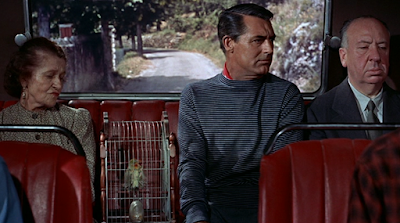One of the first questions I asked myself about Monica (2022, directed by Andrea Pallaoro) as the projectionist closed the curtains to narrow the screen was, "why is this in the Academy ratio?"* The flippant answer I gave myself is that transgender people don't get widescreen epics. Upon reflection, that's not far off. The frame of the film constrains its central character as much as her circumstances. It creates a claustrophobic space for her to exist in with no obvious room to transcend that space. The second question I asked myself, mid-film, was "why is this character a sex worker?" I know the answer to that, too, but it would be a huge relief to see a film about a trans woman who wasn't a sex worker. No shade toward sex workers, or trans women who are sex workers, but I think I can name three films this century where a trans woman character wasn't a sex worker when her occupation was known to the audience. Maybe. The third question, and it's one I asked about the similar A Fantastic Woman a few years ago, was, "is there no possibility for joy for this character?" Monica veers perilously close to trans misery porn. But then its B-plot is about a woman dying of brain cancer, so these things are relative.
"The fool, the meddling idiot! As though her ape's brain
could contain the secrets of the Krell!"
Made by a human being. AI is the death of culture.
Pages
Monday, June 26, 2023
Sunday, June 18, 2023
The Grant Mystique: To Catch A Thief (1955)
Of the films Cary Grant made with Alfred Hitchcock, To Catch A Thief (1955) is the one that has been dismissed most often by the director's admirers and detractors as a lightweight "entertainment." A bauble, if you will. Candy. Empty calories. It is certainly a film conceived of and drenched in the glamour of classic Hollywood. It pairs the biggest star in the world opposite one of the most unattainable beauties of its era. It sets its action against a backdrop of wealth and intrigue on the French Riviera and Monaco. It hobnobs with the idle rich. It's a caper film about an international jewel thief. It's pop filmmaking at its most trivial. It's a fantasy. And sure: It lacks the sinister undertones of Suspicion, the complex psychological depth of Notorious, and the stakes and forward motion of North by Northwest. But to look only at its surface gloss is a mistake. Smuggled under the candy coating is a story about hollow men in a Europe still recovering from the calamity of the great wars, in which bad men never escape their pasts and visit their sins on the next generations. It's a significantly darker film than its reputation would have you believe. It's also a portrait of Hollywood films in transition from the studio era--whose days on the stage were numbered--into a conversation with the rest of the world. This was partially filmed in Europe, perhaps with a propagandist intent. Like many American films of its era, it's a weapon in the Cold War, when Hollywood movies that wallowed in a gaudy affluence were a bulwark against the gray economic heat death of Soviet communism. All weapons should be so brazenly sexual.
Wednesday, June 07, 2023
Art School Blues
Kelly Reichardt's new film, Showing Up (2022), strikes me as a film with a verrrrry specific audience, and unless you're either a fan of Reichardt's brand of minimalism or a member of the specific audience I have in mind, a potential viewer might have a hard time with it. I'm part of that very specific audience, having been through art school and having worked on and off in the arts throughout my adult life. As a result, there's a bracing shock of recognition in this film. It captures something ineffable about trying to make art in the wreckage of late capitalism and in a world that no longer values art and artists as it once did. I've never seen a film about art before that captures just how utterly tired artists are. It's no wonder that so many artists turn into cranks as they age.


